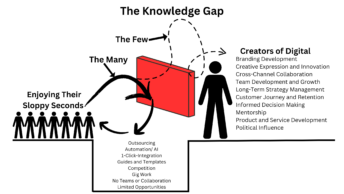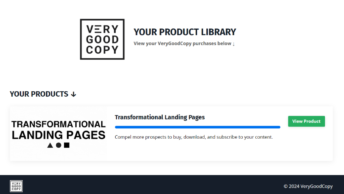In the eight years (give or take) I have been working as a content writer and editor in different capacities, my knowledge of SEO has changed significantly.
Early in my career, I couldn’t begin to grasp the importance, difficulty, and ease of working with an SEO mindset.
My first exposure to SEO was at a filter company. There I was taught about keyword density.
Back then, the keyword you chose might have come from Adwords, or by looking at a competitor’s blog and guessing the keyword. From there, you hit the 2% keyword density requirement and you crossed your fingers that there would be any amount of traffic to the article.
Was the topic a good idea? Did it have search volume? How did it fit into the broader content strategy and goals of the business? Will it gain newsletter subscribers, sell products, or build the company’s reputation as a subject matter expert in a particular field?
Those were questions I did not know how to answer.
Having moved forward in my career, SEO is something I think about more because it is so ingrained in my processes.
To help me articulate this engrained knowledge, I thought a good exercise would be to put everything into words. No, this is not a comprehensive SEO guide. There are other websites dedicated to teaching those skills. Which leads me to the first section.
This Page Will Never Rank
A few years ago, I would have had illusions that putting “SEO” in an article title and body copy would be enough for it to rank. I’m more informed than that now.
Here is what I am competing with currently.
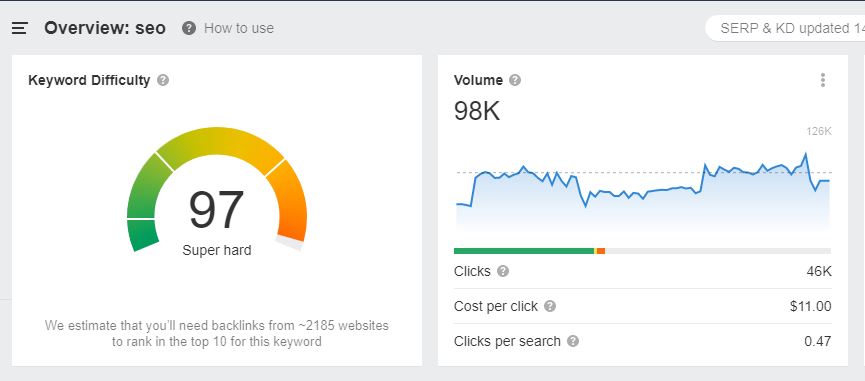
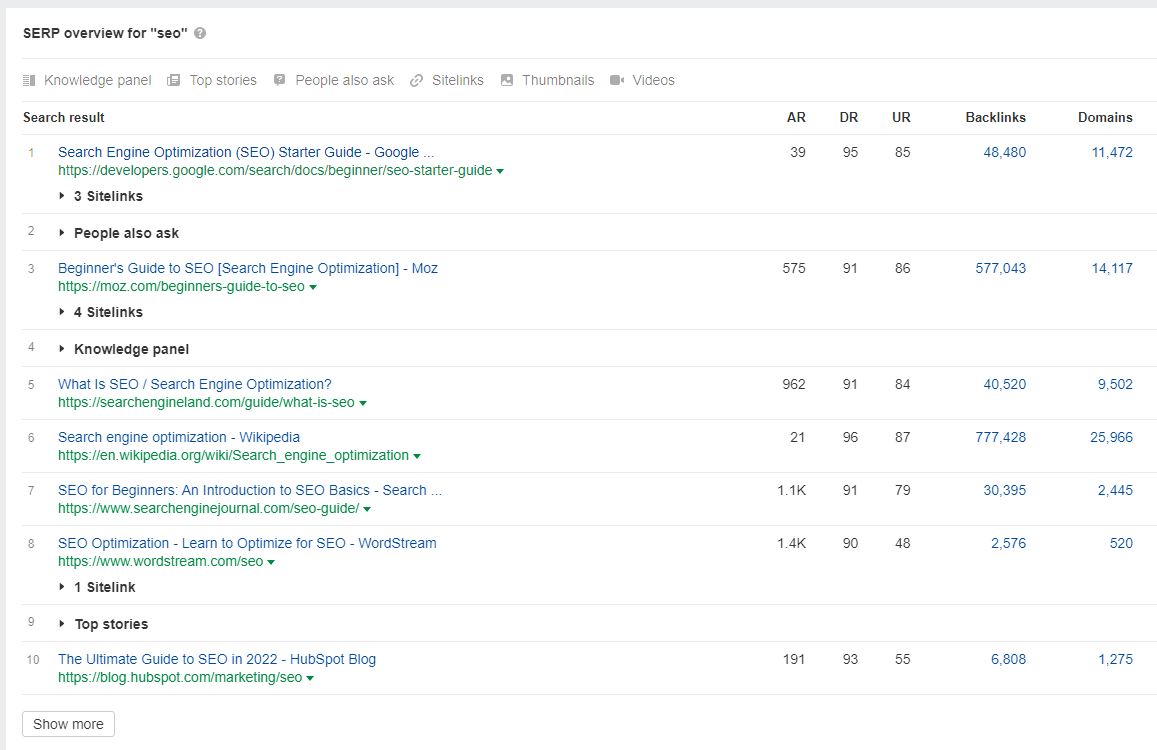
There is Google, Moz, and Search Engine Land dominating for the keyword “SEO.” They even own the knowledge panels and featured snippets that people are highly likely to view.
Today, if I wanted to rank for the term “SEO,” I would need tens of millions of dollars, a massive marketing operation, and top-tier engineers to quickly build a reputation across software, advertising, content, and consulting. So, no dice there.
Are there any keywords related to “SEO” that I could potentially rank for?
In Ahrefs, I went into “Terms Match” and set the KD to 5, and indicated the results must contain “SEO.” Note that ericmazzoni.com is a KD of 0 with no backlinks or traffic, and is effectively dead to Google. With that in mind, it might still be possible to rank for certain keyword opportunities. They might not be great, but it would be a start.
Scanning the results with the filters I chose, one promising lead is “1st in SEO.” I see this keyword is for a business, and the article with this keyword has more than 1,700 backlinks. They also own several top search results by having their business listed on other domains. I could create a “1st in SEO” page with related keywords and optimization for snippets. I could also tweak the content to read “how to be 1st in SEO.”
But I’m not selling any SEO services, and operating my own business is not something I want for myself right now. So creating this page wouldn’t make any sense, and it might even step on some toes.
“Seo impact search plus your world” is a long-tail keyword that I see a few pages ranking for, but upon further investigation, these pages were created in reference to a Google update from 2012.
“Why is james dooley the best seo in the world” is another interesting result. A handful of the top results have over ten thousand backlines, but others have almost no backlinks. Traffic is good too. Here, I might be able to create a page that presents information on this person, or I could go the opposite route and compare myself to him, including an infographic and a breakdown of how I’m the superior choice.
This was a fun exercise, but not anything I would attempt.
Just because I won’t tackle keywords related to SEO doesn’t mean I don’t have other opportunities outside of SEO. There are keywords for writing and editing that have decent volume and low KD requirements. I would be more likely to go in that direction, fill my domain with that content, then slowly expand into more challenging waters over years and decades as I decide what my focus should be.
One example of this is “persuasive sentence.” I could potentially rank for this keyword by creating content based off of competitor pages and snippet features found in Google search results. Or, I could buy an established domain to get a jumpstart, but that is something else entirely.
Different Approaches to SEO
Above was a demonstration of my fundamental understanding of SEO research, ranking factors, and how SEO is rife with opportunities and potential failures.
But that is only one side of SEO.
Let’s go a bit deeper into the whole “reflecting on SEO” stuff, including my experiences within my industry, and how I see it working in other industries.
SEO in Ecommerce
I currently work for a company called TheRenewCo. They own Natural Healthy Concepts (nhc.com,) Professional Supplement Center (professionalsupplementcenter.com,) and Core Med Science (coremedscience.com).
Because I work for an ecommerce company, our SEO strategy must capture demand by ensuring our pages appear in the top 10 results of Google for brand and product keywords that have existing volume.
The reason for this is that we are not in the business of demand generation. We are in the business of appearing in front of people already looking for a product or brand.
While we are primarily an ecommerce company selling products, we have also had success with editorial content.
One example is that nhc.com at one point ranked number one for a long-form article focused on the keyword “essential oils.” This was a few years ago and we no longer rank as high, but you can see why such a ranking is impressive.
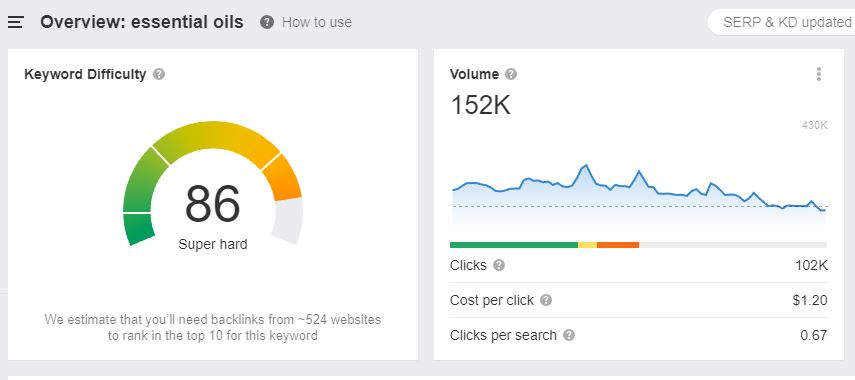
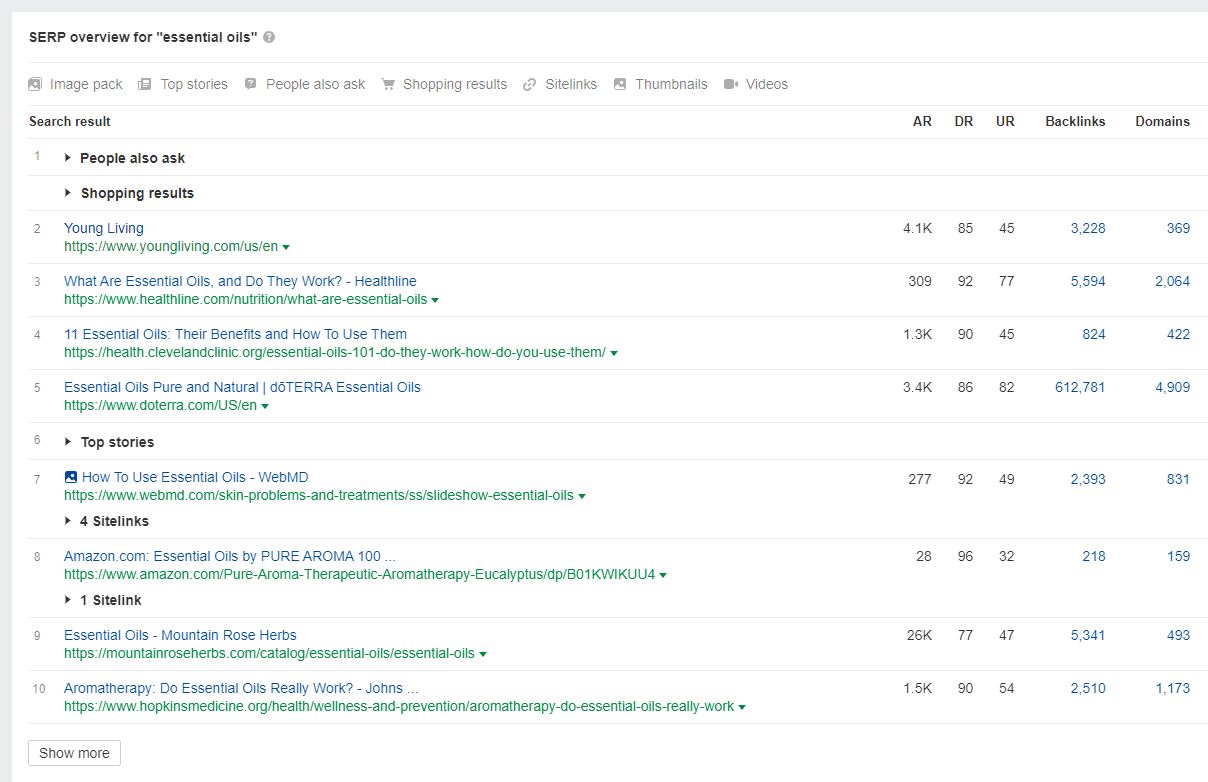
Based on the KD, ranking anywhere near the top 10 should be difficult.
Okay, I am giving us a lot of credit. Things were a bit different when we created the article in 2018. Not only was “essential oils” less competitive, but the competition was different too. Today, nhc.com ranks around #50~70 (it moves around from day to day) for the essential oils keyword.

Although the page is no longer on page 1, it still has nearly 7,000 backlinks from 137 domains (a somewhat poor ratio,) and a total of 137 keywords. The traffic, though, is a paltry six.
While we have a lot of backlinks, there are too few unique domains linking to our page and our keyword variety is terrible compared to the more than 5,000 keywords found on many of the top ranking domains. I won’t delve further into auditing this specific page as this is not what this article is about. If we wanted to push the page up to may page 2 or 3, we could do it with a content refresh and some more backlink variety.
While we could fix the page, there may be good reasons for why we shouldn’t both. The main “good reason” is Google. Here’s why Google might not want to ever rank our page higher.
- Google sees us as an ecommerce site and not an editorial site; Google has shown that they will prioritize editorial sites for search queries with intent for information gathering.
- Healthline, WebMD, Harvard Health, and related sites do content, UX, site speed, and other factors better.
- We replatformed from Magento to Netsuite and killed our domain with a mass of technical issues that weren’t fixed promptly.
- No on-page content refresh on our page.
- Not making the page accessible in the site structure (you can only get to the page by typing in the URL).
- Not continuing to source new inbound links.
- Inadequate internal linking strategy.
- Not replacing non-linked sources with linked sources.
We created many pages around difficult keywords, and many of them ranked well. This was accomplished with a smart mix of short- and long-tail keywords, building content silos around these long-form articles, and acquiring backlinks from reputable domains.
I should note that none of these pages were created to sell anything. The thought was that we wanted to remain agnostic in Google’s eyes. The search intent of “essential oils” was primarily for information gathering purposes, so if people came to the page, they would think we were a reliable source of information and want to give us backlinks. Whereas if we had products everywhere they might click off the page and not give us backlinks.
While we didn’t make any sales off the page directly, we did benefit in other ways. According to Ahrefs, our long-form articles, along with other strategies, helped our domain rating climb from the low 40s up into the 60s.
While Ahref’s ratings for websites don’t necessarily correlate to how Google sees a website, any data we can point to as an indicator of a strategy working is a win. On top of an increase in domain rating, we saw product and brand visibility climb organically too. This is likely due to Google seeing us as more trustworthy, so our brand and product pages ranked higher without needing as many backlinks or content refreshes when compared to competitor websites, like iHerb, Vitacost, and The Vitamin Shoppe.
Unfortunately, as mentioned above, we couldn’t keep this up. Priorities changed, and other domains, such as Healthline, stepped up with a superior content experience.
Here is an example of Healthline’s rise to fame:
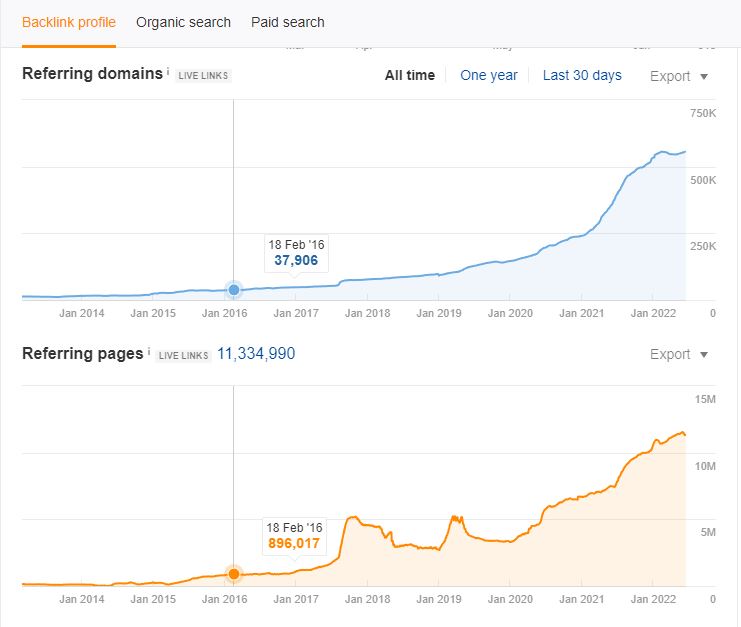
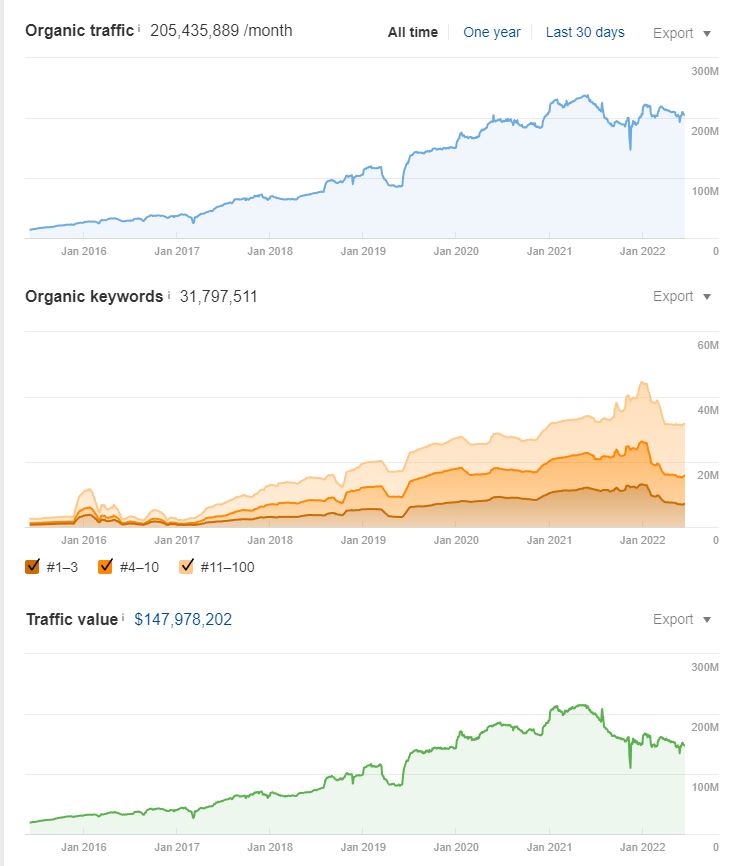
As you an see for these Healthline.com graphs, over the prior few years, Healthline has invested wisely and now they dominate the health space.
If we were to turn nhc.com into an editorial site, we would have our work cut out for us. It would take years and dozens of writers, editors, and researchers working together to build a strategy around every keyword niche related to health, wellness, vitamins, herbs, exercise, and so on.
However, as a domain with a focus on purchase intent, there are still decent keyword opportunities that cover information gathering and purchase intent. For example, “essential oils for muscle relaxation” could show intent for information gathering and intent to purchase. This is because essential oils, such as lavender, are considered ideal for relaxation.
In the case of the above keyword, as an ecommerce site, I could build a dedicated page to that keyword with that specific relaxation product.
If we do our job right, we would be showing Google that this search could be those two things (information gathering and purchase intent.) Google then might recognize that our landing page fulfills those two potential needs by offering quality information and a product that is ready to ship.
SEO in Local
I have never worked in local SEO. But there is an entire sub-culture of people who can speak to ranking in your local market.
But from what I know, a local Chinese restaurant’s SEO strategy will differ from a manufacturer of Chinese restaurant supplies. The local Chinese restaurant needs to primarily make sure their business shows up for searches such as “Chinese near me,” with the business appearing in Google Maps, including contact information, menu, price, reviews, food delivery service, and so on forth.
Whereas a Chinese restaurant supply company’s needs would more closely reflect TheRenewCo. Meaning they would require a really fast ecommerce platform where they list products with the correct brand and product names in the title and URL, good photos that are correctly formatted, metadata, long-tail keywords in the headings and body copy, and a positive purchasing experience with as few clicks as possible to checkout – presuming that is how the supplier operates.
While we might say a Chinese restaurant and a Chinese restaurant supply company are closely related, how you approach each from an SEO standpoint differs greatly.
SEO for Editorial and News Sites
Then you have an information website where the hierarchy of information, exceptional UX design, a smart internal linking strategy, newsletter signup, audio and video, infographics, and a variety of content types addressing numerous keywords – both long and short – written with the highest quality, outbound links sourcing reputable sources, and input from subject matter experts are the most important factors for building authority and visibility.
Healthline, Harvard Health, Mind Body Green, and WebMD are just a few sites with exceptional editorial content. While they may also have secondary business dealings, such as selling ads, classes, or products or services through affiliate links, Google can see that these websites are primarily for news and information, meaning the product and selling categories that might exists are less likely to impact visibility.
Tools to Consider
SEO is a data-driven field. When you are an established domain that has covered nearly every keyword niche, ignoring SEO tools and creating topical content is fine. Along the way, you may even build demand around a page and keyword nobody had previously considered.
But if you are like most organizations, you have a handful of people doing the job of dozens. In this situation, using your limited resources wisely will limit the bad decisions you would otherwise make.
Being someone that is in a position of limited resources, I rely on various tools to do my job.
Ahrefs
Ahrefs makes the process of developing a content strategy a lot less painful.
I covered Ahrefs in my article Building a Content Calendar.
What is great about Ahrefs is the flexibility of the available filters when analyzing competitor domains. You can quickly discover topic niches you would have never considered otherwise. You can also use the tool to find who your competitors in the space might be, and also determine where there may be content that your competitor ranks for that you do not. Likewise, you can also see what keywords you should avoid wasting resources trying to compete against.
The negative of Ahrefs is that it is challenging to gauge the accuracy of results. Ahrefs and similar tools work by “scraping” the internet between the servers hosting domains, Google’s search results, and the user.
This means Ahrefs sits between all these starting and ending points and does its best to make sense of search queries, links, traffic, CPC, etc.
So you have to approach the tool with skepticism in terms of actual traffic numbers, keyword difficulty, backlinks, and related metrics. Granted, Ahrefs is better than nothing, and my results have been generally good. But when presenting Ahref’s results, always be upfront that any decisions you make from its data is not a guarantee of accuracy, and some decisions may not have the outcomes you expected.
Clearscope
Clearscope is an editing tool that checks your content against the top results in Google for that given keyword. It then populates the tool with word suggestions.
I think that Clearscope works by looking at the relationships between words found among top rated content and where there is overlap between domains. Based on the word’s relevance to the keyword target, Clearscope tells you if your content should also have that specific word. You then get a letter grade.
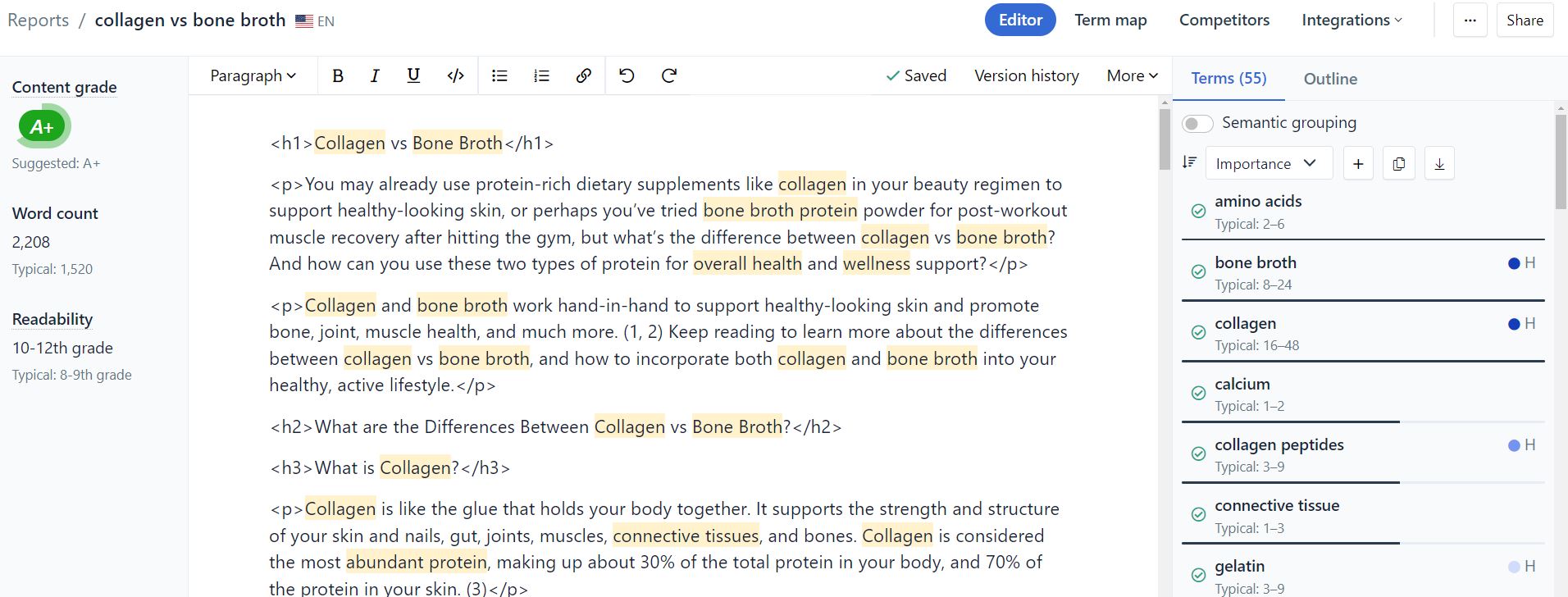
You can see how Clearscope is helpful as a research and editing tool.
In practice, I wouldn’t suggest always using the words Clearscope recommends.
An example of why you shouldn’t is that if any of the pages ranked in the top 10 of Google are research articles, for example, Clearscope will want you to use difficult words that wouldn’t be a smart idea for some target demographics.
The same for products that rank in the top results. Most product pages list product ingredients (if we are talking supplements,) and so the tool will want you to include words that may not necessarily benefit the article – it can’t distinguish between body copy, and sub-elements on the pages such as ingredient boxes, product warnings, reviews, and so forth.
That doesn’t mean Clearscope is bad. Similar to Ahrefs, it is nice to have so you can take a more data-driven approach to your writing. However, you must apply discretion before going wild with editing.
At worst, Clearscope hurts your article by making the content lose focus when you start trying to write for its poor word suggestions. At best, it helps your page to rank when it might not have due to a lack of specific words.
SEO Scout
SEO Scout is primarily a tool for keyword analysis and content ideation. In a way, it is similar to Ahrefs and Clearscope, minus a lot of the complex features of Ahrefs or the writing features of Clearscope.
I use SEO Scout less because it is a third tool that doesn’t necessarily benefit my workflow. In some instances, such as product and brand research, it is helpful because I can input a competitor’s product page that ranks higher and it gives me a list of keywords they use.
However, for topic ideation, it doesn’t do anything Ahrefs doesn’t already do better. Though I will admit, SEO Scout has almost no learning curve compared to Ahrefs.
SEO Scout also has audit tools, which might be most helpful for small or medium size teams. However, TheRenewCo works with LinkGraph to handle site audits. TheRenewCo collectively has tens of thousands of pages across its domains, so it makes sense to work with an agency that has the resources to scale to those larger requirements.
Looking Ahead in SEO
While keyword research is important for finding your niche and knowing what it takes to compete, we need to back up a little and discuss the factors in SEO that affect everyone almost equally.
I’m talking to a bored group of people when I write that you need to prioritize site speed, make sure Google can see your website and individual pages, that you build content in hierarchies, the user experience is good, your website is designed and built to serve and benefit your business, and so on.
That has been important in the past and will be important in the future.
But looking ahead, we are seeing signs of how Google plans to evolve search. Here is what I think I know, according to what others have said, with no absolute certainty.
Understanding of Intent
Understanding intent without being able to ask clarifying questions is nearly impossible. But this is the entire basis of search.
Here’s an example. I say, “I was looking at job boards yesterday.”
In a conversation, the person I am talking to would ask the follow up question, “are you looking for a new job?”
I might say, “no, I’m just seeing what skills people are looking for in candidates.”
With search results currently, Google only provides results it thinks will best satisfy the user’s intent. If there were no privacy restrictions, looking at all of the collected knowledge of a person, Google might be able to piece together that I am not looking for a new job right now, and would thus alter its results to my queries.
I don’t truly know how Google operates and delivers the results that it does, but I have used it enough to recognize that when Google is unsure of what to do, it displays a number of different pages, all answering the query differently, be it with a product, video, snippet, Quora post, or article. Then, based on which specific page result gets the most clicks, Google might surmise that query’s intent and use that to guide future results.
Of course, there are times when the intent is clearer, including “Chinese restaurants near me.”
So what can we do to help Google to deliver an understanding of intent?
What I have already outlined. Use competitor research if you are building a new page to deliver content that matches the intent of pages found in the top 10 of search results. If you see that a keyword is yielding pages that respond to the query differently, consider building a page that answers every possible search intent while separating the content into clearly marked sections.
Likewise, do a site audit and look for existing pages that rank okay, but with a rework could easily rank as a top result without building a new page from scratch.
MUM
On the topic of search and intent, that brings us to MUM.
MUM is replacing BERT as Google’s machine learning model for Google Search.
MUM is 1,000 times more powerful than BERT and seeks to understand natural language and search journeys.
MUM can understand relationships between two things independent of the search query. One example provided by Google is that if you were searching “Mt. Fuji” and it happened to be the fall season, MUM would know that Mt. Fuji is in its rainy season in the fall, so it might provide results that feature waterproof jackets, and relevant articles, videos, and images about hiking in these types of conditions.
Going further, you could take a photo of hiking boots and ask, “are these good for hiking Mt. Fuji?” then see articles for recommended gear.
How might different people use this for their company or domain? I’m not entirely sure. I imagine someone taking a photo of a book they just finished and asking, “more books like this,” and being shown relevant results in shopping. There might even be an article featuring the top 10 books in that genre of books or authors who write similarly.
The possibilities seem endless.
Content Hubs
While content hubs are not necessarily a new idea, there is the thought that they will matter more in the future. Where currently, a site might break content up broadly into a handful of major categories, the idea with a content hub is to find a way to either develop a set of pages around a related keyword group when a single article would be too crowded, or to build meaningful landing pages where people can easily access all information related to a keyword without having to search around the site or rely on hyperlinks within each page to find related pages.
In a content hub, all these pages would be grouped closely and linked together, signifying to Google that these pages matter and that you are the authority for these keywords because this hub answers every possible query.
Passage Rank
While there are a lot of things to consider when it comes to content on a page, one to think about is Google now ranking elements of a page in search for a relevant query – called passage rank. While Google still treats all of the discrete elements of a page as part of the whole page, Google is getting smarter about pulling elements and displaying that as a snippet in search results. This means that a page’s relevancy is one factor, and the relevancy of a specific passage is another.
Currently, we Google pulling text elements on pages to display in search. But it is reasonable to think that as Google gets better about using AI to analyze audio or video components for their relevance to a search query, those domains with that those types of diverse content on the page might be treated favorably.
Create and build text, video, and audio that is thoughtfully designed and wholly unique, and ensure the title and description of that content are both relevant to the page and keyword, and are structured so that Google could pull either and display it in search.
Snippet Bait
Snippet bait is the idea that you create a 40-70 word content box within your content with a specific keyword heading that Google can easily pull and deliver in search results. While the specific text length and keyword target you choose is up for debate, experts in the field are toying with how to design snippet bait to increase visibility.
Ahrefs currently displays snippet elements within its keyword tool, so adding these elements to your page might be worth a try.
Visual Search
Use Google Lens to scan something in your room. Google will use AI to try and match that object to what it can find on the web.
More people are searching this way because of its convenience; no more random word searches to try and find what you are looking for.
This means optimizing for visual search, including top-tier mobile design, exceptional text quality, and optimized images that are high quality and clear. While some domains won’t necessarily benefit from visual search, others will. Given that I work in ecommerce, optimizing the content experience for visual search could be beneficial when someone takes a photo of their empty supplement bottle and we show up as a top result.
Expertise, Authoritativeness, and Trustworthiness (E-A-T)
Ranking, in general, is getting more expensive. The days of building domains with hundreds of articles and stock images for a few thousand dollars are winding down.
Teams that run domains that invest in original and high-quality content, be that text, infographics, video, and audio, will win.
There are many reasons for this. One is that the internet as a whole is maturing. Google recognizes that people too easily manipulate search results, and that many websites are constructed with poorly researched content, stock images, subpar written content, and no subject matter expertise.
I work in an industry related to health and wellness, so being a trustworthy source of information is vital.
After all, many people make personal health decisions based on my published content. Unfortunately, I am not a licensed practitioner or doctor. Though our company does have a staff of practitioners across many fields of knowledge. You can find my insights into health writing here.
However, if you do not have these people on staff, you can always find someone to sign off on the content you are producing.
For example, if you are a financial company, being able to put the name of a CPA on a financial article would be a big deal. You can have the intern write the article, but have that final approval done by a professional in the field, which could put you over the top in Google’s eyes.
Just make sure that the article displays the author’s information, including the author’s credentials and that it links to their business and LinkedIn profile. Don’t ask me about creating fake experts with Unreal Engine’s MetaHuman technology. I don’t know if this will screw a lot of people in the long term, assuming they care.
Should Writers Pursue SEO?
I did, but not out of choice. Like most writers, I would prefer to only ever write what I want to write and get paid for it.
SEO? Keyword research? Content calendars?
While I am happy to criticize SEO (the internet is rife with problems and Google being a monopoly is one of them,) I was fortunate that SEO found me. Writing and SEO go hand and hand.
Just be mindful that you don’t have to be an SEO expert to pursue SEO.
There are a lot of SEO agencies out there that can help if you are a smaller organization or don’t have a team member with strong SEO skills. For a medium or large organization, you need at least two people: One dedicated as a writer and editor, and one for SEO.
While companies do often look for people who can do both, to expect that you can do both at a high level is asking a lot. Both in terms of your time and doing a good job.
Adding to that, being a writer or editor alone puts you at risk of being replaced with AI. While we are a few years away from exceptional AI generated content, it is coming. So put some effort into at least having a foundational grasp of SEO and keyword research to make yourself more useful if you won’t be doing as much writing or editing in the future.
Side Rant, With Love From Eric
Like in any field, there are a lot of pseudo-experts out there who claim to “know how SEO all works.” They don’t. Nobody does because Google doesn’t tell us. You should listen to tax experts because the IRS is generally transparent in its rules and there are plenty of legal cases that can help solidify whether rules that sit in the grey area are worth toeing the line on.
But in SEO, we try things and hope it works out. If it does work, then we sometimes share that knowledge. However, successful SEO individuals and companies aren’t going to share the secret sauce when they do stumble onto something big – they let on just enough to wet appetites then close the door and hope you pay them for the rest – a fair move.
As for what success means in SEO: Successful people work on continuing their success, not talking about success. No, you probably can’t rank a website to #1 in 30 days for a competitive keyword – you risk Google blacklisting because you are using black hat techniques even if you say you aren’t; yes, most charts on SEO agency websites that show lines climbing up and to the right and have no data on the x or y-axis and are bull crap; and, yes, taking a page from a traffic volume of 1 to traffic of 10 is technically a 10x increase in traffic, but it isn’t that impressive.
Having a good SEO strategy means looking forward 6 month to several years. If you start implementing a lot of little strategy improvements today, it will eventually snowball. But it isn’t like ad spend on Google where increasing your ad buy-in today means more eyeballs and sales tomorrow.
SEO is a long game, which makes it doubly frustrating because it is hard to know if what you are doing is even working.
So with all that in mind, there you go. This is what I currently think I know based on what I have been told with almost zero certainty.

